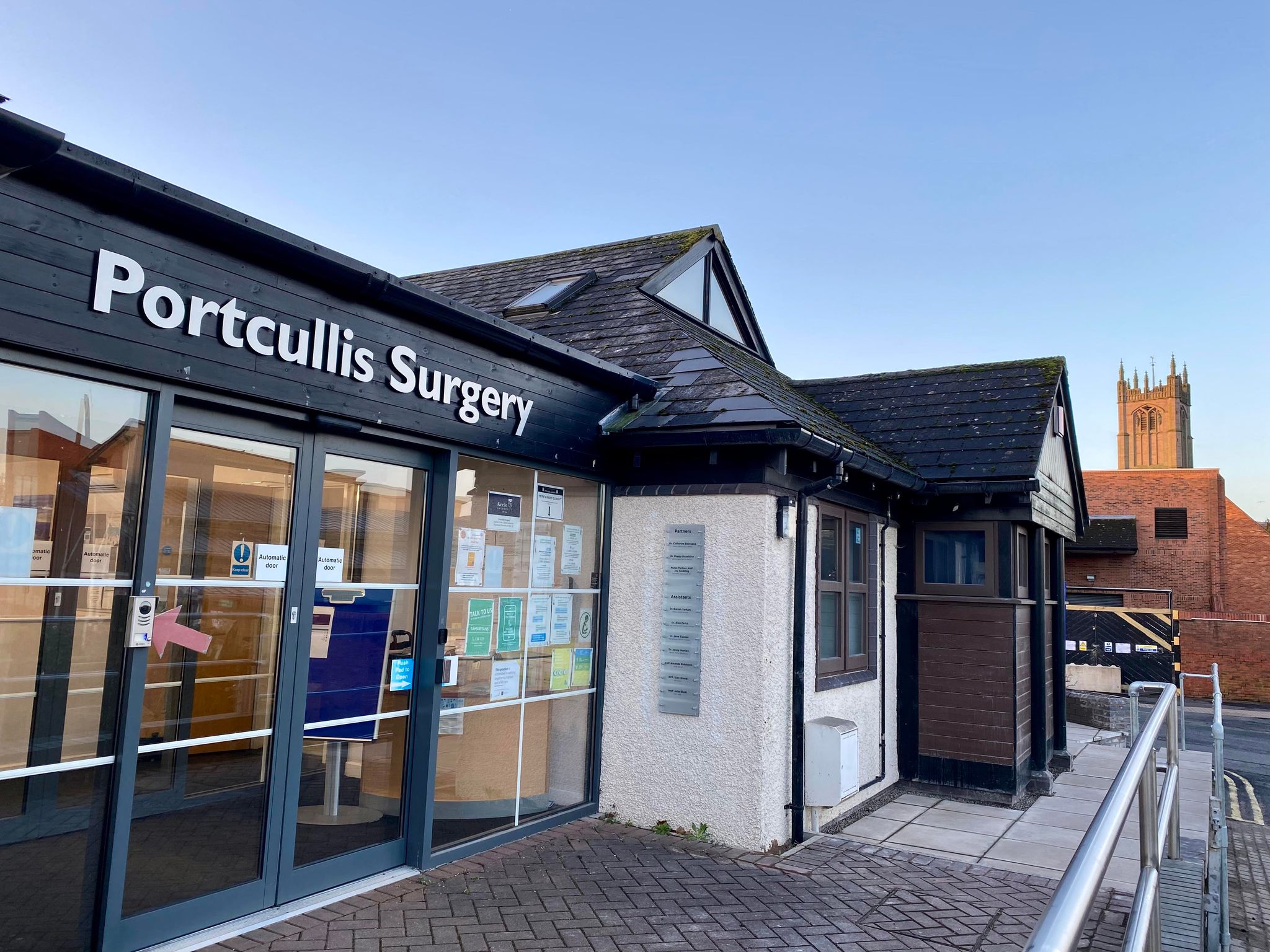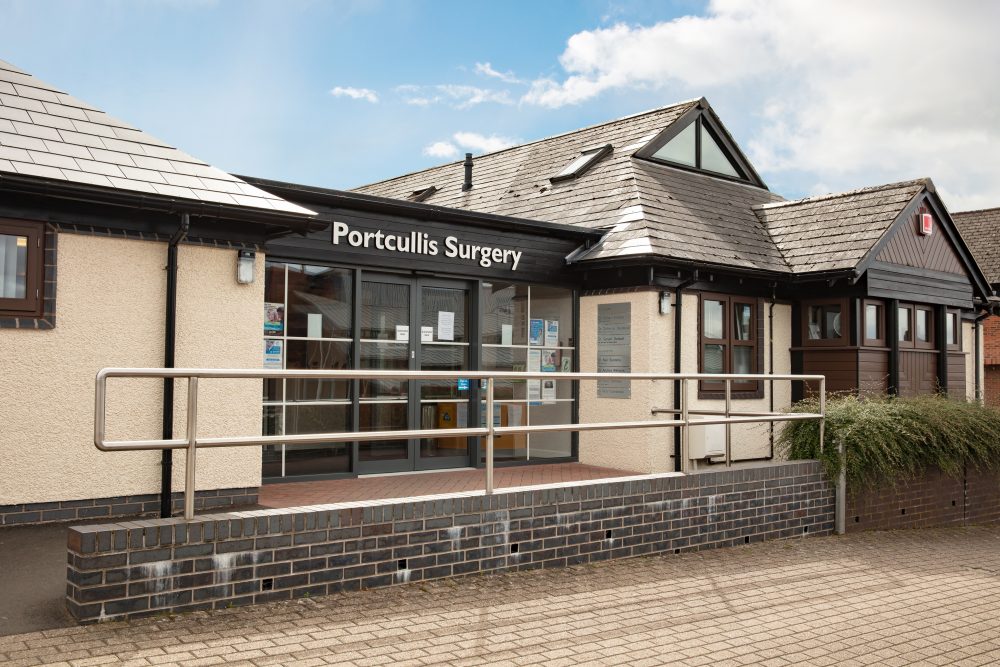Portcullis Surgery
Portcullis Lane, Ludlow, SY8 1GT Send us an online question or request
Telephone: 01584 872 939
We are closed. Call 111 for urgent advice out of hours.

Merry Christmas and a Happy New Year! Congratulations to Dr Yarham on his retirement Congratulations to our Paramedic Sian Woods, Masters in Advanced Clinical Practice and Lead Clinician for Minor Surgery WAITING TIMES ARE CURRENTLY VERY LOW Focus on Women’s Issues Thankyou to the family of Mr Bill Friswell. Information about Home visits and waiting times- IMPORTANT please share this information RIP Mrs Gloria Corfield Dr Jenny Hartley attends 10 Downing Street Covid and Flu vaccines
New process of death certification -what to do when someone dies
What to do when someone dies
Unexpected death
If the death is unexpected you should call 111/999. Whenever a death is suspicious it must be reported to the police. Unexpected deaths will usually be reported to the local coroner to begin the process of establishing a cause of death
Expected death
If the death is expected, there needs to be a process whereby the death is confirmed.
Confirmation or Verification of Death
Confirmation or verification of death is defined as deciding whether a person is actually deceased. English Law allows that any competent adult may verify that someone has died, but it does not place them under a legal obligation to do so. Confirmation or verification of death is usually undertaken by:
- a registered nurse who took care of the patient in a hospital ward, hospice or nursing home,
- a paramedic attending the death,
- a district nurse or palliative care nurse involved in their care
- or a Medical Doctor or GP involved with the patients care.
Once the death has been verified you will need to call the GP if the death occurred outside a Hospital or Hospice setting.
Calling a Funeral Director
Once the death is verified you can call a funeral director to collect the body of the deceased. If you do not have a funeral director then you may need to call one to make arrangements.
https://www.funeral-directory.co.uk/
Informing the GP in order to start the Process of Certification of Death
Please note that all death certificates now need to be reviewed by an independent medical examiner so death certificates may take longer than 5 days to be approved. It is no longer a legal requirement to register a death within 5 days of death so please do not be concerned if the process takes longer than previously.
The GP receptionist will take the following details from you:
- Name, DOB and Address where the person died
- Date and Time of Death
- Who was present when they died
- Patients previous occupation
- Patient’s NOK, telephone numbers and address
- Name and address of Funeral Director
- If the deceased requested a burial or cremation
Duty Clinician at the GP Surgery
The Doctor involved in the deceased persons care or the Duty Clinician will usually call you to offer condolences and check the information you have given within 1-2 days. They will discuss the likely cause of death and advice you if need to refer the death to the coroner in the case that the cause of death is unknown or uncertain.
If the Doctor who can certify death is not available the duty clinician will let you know when the Doctor will be available to inform the medical examiner office.
All expected deaths now need to be reported to the Medical Examiners Office so that they can provide an independent review of the causes of death.
Therefore death certificates may take more than 5 days to be approved. It is no longer a legal requirement to register a death within 5 days of death so please do not be concerned if the process takes longer than previously.
You cannot set a date or book a funeral with your funeral director until the certificate has been approved by the Medical Examiner.
Who are Medical Examiners and Medical Examiner Officers?
The Medical Examiners ensure that all deaths are reviewed by someone who is independent and who was not involved in the patient’s care. The Medical Examiner will work with the treating doctor (such as the GP or specialist doctor) to ensure that the information given on the Medical Certificate of Cause of Death (MCCD) is correct and that referrals to the Coroner are made (if needed) as soon as possible.
Medical Examiners and their staff (called Medical Examiner Officers) offer families and carers a chance to ask questions or raise concerns about the cause of death or about the care they received before their death. This will usually be completed over the telephone.
A key role of the Medical Examiner is to make it easier for the bereaved to understand the Medical Certificate which explains the cause of death. Medical Examiners also look at medical records and discuss the causes of death with the doctor filling in the Medical Certificate.
The Medical Examiner service will provide an independent view and they will only review cases where they, or their staff, have not provided care for the patient.
What will I be asked when the Medical Examiner’s Office contact me?
The Medical Examiner service will explain what is written on the Medical Certificate. They will discuss the care the person received before their death. This is the best time for you to raise questions and speak about anything that concerns you, but you can contact the service to ask further questions if you wish to do so. If the Medical Examiner service cannot provide answers, they will pass them on to someone who can investigate further.
Why am I being asked if I have any concerns?
A discussion with a Medical Examiner or their staff provides you with an opportunity to have an open and honest conversation and address any worries or concerns with someone who was not involved in providing care to the person who died. It could be as simple as helping you to understand more about the treatment and cause/s of death or to understand the medical language used. There may be something about the care which you think did not feel right – this is an opportunity to ask questions. As well as answering your questions, this can help us to learn and provide better care for patients, their families and carers by recognising ways in which care can be improved in the future.
If it is too difficult for me, can someone else speak to the medical examiner?
Yes, the Medical Examiner service may contact you to ask who you would like us to talk to instead, or you can let the medical team know if you would rather appoint someone else as a point of contact. The Medical Examiner service will usually contact you by phone however, we can make other arrangements if you let us know.
What if I do not want to speak to the Medical Examiner or their staff or I do not want to tell them about my concerns?
Medical Examiners are independent, so we would like you to speak to them or their staff, if possible. They will help explain things to you and are trained to answer your questions. However, we understand this is a difficult time for many people and so speaking to someone is completely your choice.
If you are not sure, you can contact the Medical Examiner Service on: Telephone: 01743 261384 or 01952 641222 ext 4741 Email: sath.medicalexaminers@nhs.net
They can give you more information which will help you decide if you want to speak with the Medical Examiner service, they are trained to help people during difficult times and will be very understanding and supportive.
Will funeral plans or release of the body take longer?
Medical Examiners make every effort to avoid any delays and work with families and carers of the person who died to meet the legal requirements for registering deaths. Each case will be dealt with individually and, when possible, the Medical Examiner’s office will try to give priority to those where relatives need urgent release of the deceased, whilst ensuring due process is undertaken.
What can I do if I have questions or concerns about the Medical Examiner process?
If you are not satisfied with the Medical Examiner’s advice, we suggest you discuss this with staff from the Medical Examiner’s office in the first instance.
If you are still not satisfied, you can contact the Patient Advice and Liaison Service team (PALS). You may also contact the doctor the death certificate was issued from which may be a GP.
How can I contact the Medical Examiner office?
You can contact the Medical Examiner office either by phone or email: Telephone: 01743 261384 or 01952 641222 ext 4741 Email: sath.medicalexaminers@nhs.net Our office is open between 9:00am and 5:00pm Monday – Friday, the team are available to take your call from 11am onwards. Further information about the Medical Examiner system can be found on the internet: http://www.england.nhs.uk/establishing-medical-examiner-system-nhs/ .
Coroners
Some deaths must be notified to the Coroner.
When the Coroner starts an investigation, they will investigate the death independently – although the Medical Examiner may still provide expert medical advice to the Coroner. Further information in relation to Coroners can be found on the Ministry of Justice website:
or you can e-mail coroners@justice.gov.uk.
Opening Times
- Monday
08:30am to 06:00pm
6.30-9.30pm Bookable in advance appointments only.Call 111 for advice OOH - Tuesday
08:30am to 06:00pm
6.30-8pm Bookable in advance appointments only. Call 111 for advice OOH - Wednesday
08:30am to 06:00pm
6.30-9.30pm Bookable in advance appointments only.Call 111 for advice OOH - Thursday
08:30am to 06:00pm
6.30-8pm Bookable in advance appointments only.Call 111 for advice OOH - Friday
08:30am to 06:00pm
6.30-9.30pm One Friday a month Bookable in advance appointments only.Call 111 for advice OOH - Saturday
CLOSED
9-5pm One Saturday a month Bookable in advance appointments only.Call 111 for advice OOH - Sunday
CLOSED
Call 111 for advice OOH






